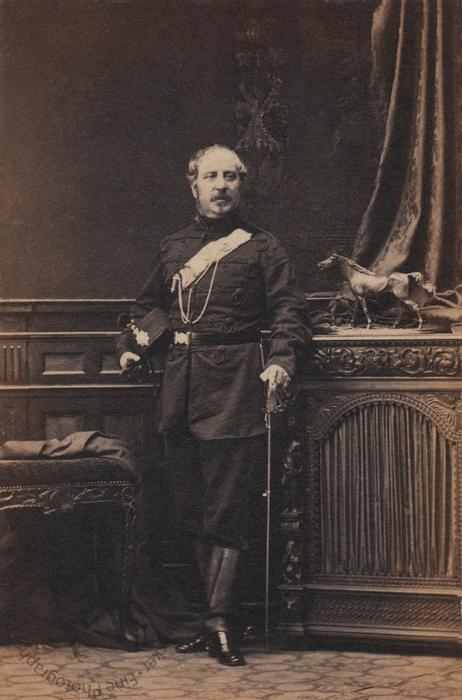Major Robert Cochrane
(1795-1864)
12 April 1862
Volume 6, page 191, sitting number 7633.
[Identified as ‘Major Cochrane’ in the Silvy daybooks, this is probably Major Robert Cochrane of the Rifle Brigade.]
Born at Gibraltar in or about 1795, he was the son of Captain Robert Cochrane, later of the Flintshire Militia (died 9 January 1829, aged 79).
Cochrane joined the Army when he was about 14 years old, serving in the 95th Regiment of Foot, which eventually became the (Prince Consort's Own) Rifle Brigade. He saw action in the Peninsula Campaign and was wounded at the Battle of Waterloo. He retired on full pay in 1841 and was appointed one of the Military Knights at Windsor, where he spent the rest of his life. He was gazetted an Honorary Major of the Army on 28 November 1854.
On 15 December 1840, at St Mary Abbots in Kensington, Captain Cochrane married Margaret Sarah Anne Jones, daughter of Jacob Jones of Norton le Moors, Staffordshire. Their marriage produced at least four sons. The growing family appears on the 1841, 1851 and 1861 censuses living in the Lower Ward of Windsor Castle.
Major Robert Cochrane died, aged 69, on 27 May 1864 at the Lower Ward, Windsor Castle, ‘deeply lamented by his wife and family’ (Evening Standard, 4 June 1864). The following obituary appeared in the St James’s Chronicle (4 June 1864) under the title ‘Death of a Military Knight of Windsor.’
‘We have to record the death of Major Robert Cochrane, a veteran and gallant officer, who had seen much service. He entered the army in 1809, and in August, 1811, proceeded to the Peninsula, where he continued with his regiment, the Rifle Brigade, until the close of the war, being present at the defence of Cadiz, the actions of Aranjuez, San Minos, San Milan, the Bridge of Vera, and at the Battle of Vittoria. Subsequently on the Continent he went through the campaign of 1815, and was at the Battle of Waterloo and the capture of Paris, and, commanding the advanced guard of his corps, was the first officer to enter that capital. Major Cochrane was severely wounded in the left arm at Vera, and slightly in the breast at Waterloo. He had the war medal and one clasp for the Peninsula, and the Waterloo medal. Major Cochrane will be buried in the catacombs of Windsor Castle to-day with military honours; the funeral cortège will include the naval and military knights in full uniform.’

